英语单词记忆方法—思维导图法(二)
- 格式:docx
- 大小:1.71 MB
- 文档页数:73

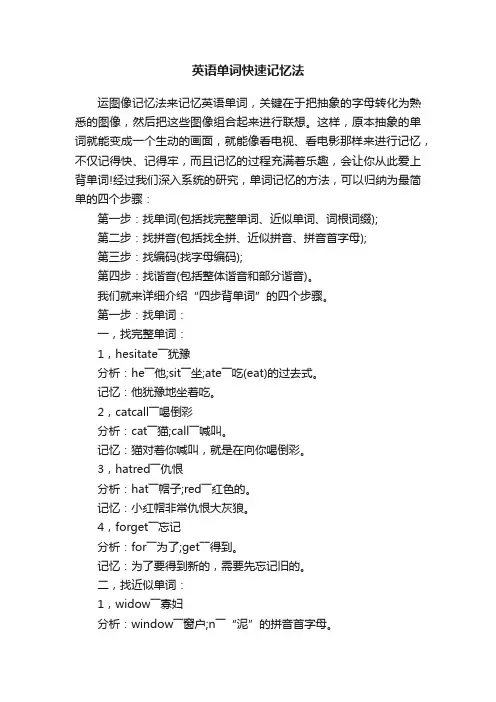
英语单词快速记忆法运图像记忆法来记忆英语单词,关键在于把抽象的字母转化为熟悉的图像,然后把这些图像组合起来进行联想。
这样,原本抽象的单词就能变成一个生动的画面,就能像看电视、看电影那样来进行记忆,不仅记得快、记得牢,而且记忆的过程充满着乐趣,会让你从此爱上背单词!经过我们深入系统的研究,单词记忆的方法,可以归纳为最简单的四个步骤:第一步:找单词(包括找完整单词、近似单词、词根词缀);第二步:找拼音(包括找全拼、近似拼音、拼音首字母);第三步:找编码(找字母编码);第四步:找谐音(包括整体谐音和部分谐音)。
我们就来详细介绍“四步背单词”的四个步骤。
第一步:找单词:一,找完整单词:1,hesitate――犹豫分析:he――他;sit――坐;ate――吃(eat)的过去式。
记忆:他犹豫地坐着吃。
2,catcall――喝倒彩分析:cat――猫;call――喊叫。
记忆:猫对着你喊叫,就是在向你喝倒彩。
3,hatred――仇恨分析:hat――帽子;red――红色的。
记忆:小红帽非常仇恨大灰狼。
4,forget――忘记分析:for――为了;get――得到。
记忆:为了要得到新的,需要先忘记旧的。
二,找近似单词:1,widow――寡妇分析:window――窗户;n――“泥”的拼音首字母。
记忆:寡妇的工作是要把窗户上的泥擦干净。
2,2,knack——诀窍分析:knock——敲门;a——“一”。
记忆:敲门的诀窍是只敲一次。
3,peak――山顶分析:speak――说话;s――外形像蛇。
记忆:有一条蛇在山顶上说话。
4,lurch——突然倾斜分析:lunch——午餐;r——“人”的拼音首字母。
记忆:那个人正在吃午餐的时候,桌子突然倾斜了。
5,roof――屋顶分析:room――房间;f――外形像拐杖。
记忆:我房间的屋顶上插满了拐杖。
优秀经验分享:太多的人总是抱怨学不进去,记不住,思维转得慢,大脑不好使,吸取知识的能力太差,学习效率太低。
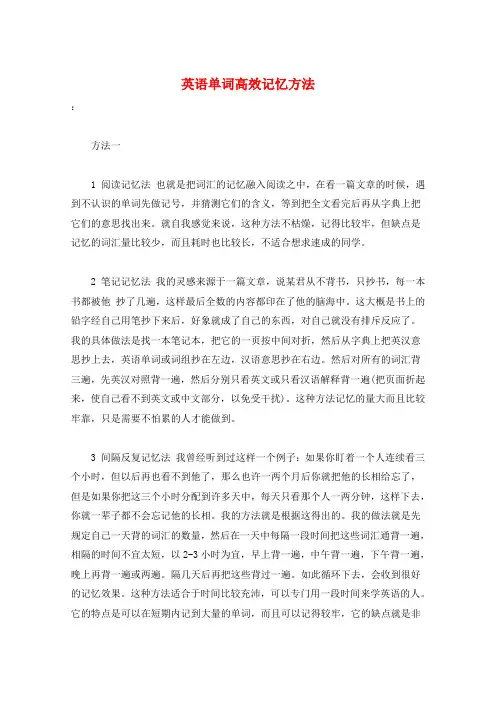
英语单词高效记忆方法:方法一1 阅读记忆法也就是把词汇的记忆融入阅读之中,在看一篇文章的时候,遇到不认识的单词先做记号,并猜测它们的含义,等到把全文看完后再从字典上把它们的意思找出来。
就自我感觉来说,这种方法不枯燥,记得比较牢,但缺点是记忆的词汇量比较少,而且耗时也比较长,不适合想求速成的同学。
2 笔记记忆法我的灵感来源于一篇文章,说某君从不背书,只抄书,每一本书都被他抄了几遍,这样最后全数的内容都印在了他的脑海中。
这大概是书上的铅字经自己用笔抄下来后,好象就成了自己的东西,对自己就没有排斥反应了。
我的具体做法是找一本笔记本,把它的一页按中间对折,然后从字典上把英汉意思抄上去,英语单词或词组抄在左边,汉语意思抄在右边。
然后对所有的词汇背三遍,先英汉对照背一遍,然后分别只看英文或只看汉语解释背一遍(把页面折起来,使自己看不到英文或中文部分,以免受干扰)。
这种方法记忆的量大而且比较牢靠,只是需要不怕累的人才能做到。
3 间隔反复记忆法我曾经听到过这样一个例子:如果你盯着一个人连续看三个小时,但以后再也看不到他了,那么也许一两个月后你就把他的长相给忘了,但是如果你把这三个小时分配到许多天中,每天只看那个人一两分钟,这样下去,你就一辈子都不会忘记他的长相。
我的方法就是根据这得出的。
我的做法就是先规定自己一天背的词汇的数量,然后在一天中每隔一段时间把这些词汇通背一遍,相隔的时间不宜太短,以2-3小时为宜,早上背一遍,中午背一遍,下午背一遍,晚上再背一遍或两遍。
隔几天后再把这些背过一遍。
如此循环下去,会收到很好的记忆效果。
这种方法适合于时间比较充沛,可以专门用一段时间来学英语的人。
它的特点是可以在短期内记到大量的单词,而且可以记得较牢,它的缺点就是非常枯燥,要有毅力的人才能坚持背下去。
方法二1.联即联想记忆法。
看到某个单词,应该回想一下,有没有和自己以前记忆的单词在形或意思方面的近似。
譬如,遇到consult,就应该想到和外形差不多的单词,如 result ,insult等,这样就会记忆一个单词的同时又复习了其它的单词,而且不致于混淆。
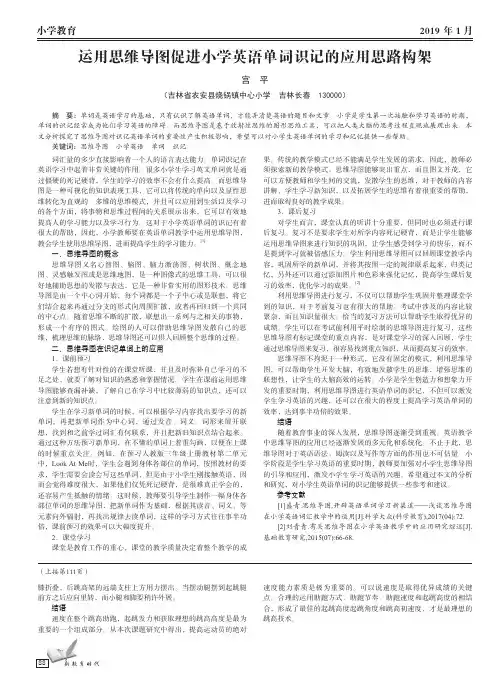
小学教育2019 年 1 月88运用思维导图促进小学英语单词识记的应用思路构架宫 平(吉林省农安县烧锅镇中心小学 吉林长春 130000)摘 要:单词是英语学习的基础,只有认识了解英语单词,才能弄清楚英语的题目和文章。
小学是学生第一次接触和学习英语的时期,单词的识记经常成为他们学习英语的障碍。
而思维导图是基于放射性思维的图形思维工具,可以把人类大脑的思考过程直观地展现出来。
本文分析探究了思维导图对识记英语单词的重要性产生积极影响,希望可以对小学生英语单词的学习和记忆提供一些帮助。
关键词:思维导图 小学英语 单词 识记词汇量的多少直接影响着一个人的语言表达能力。
单词识记在英语学习中起着非常关键的作用。
很多小学生学习英文单词就是通过僵硬的死记硬背,学生的学习的效率不会有什么提高。
而思维导图是一种可视化的知识表现工具,它可以将传统的单向以及显性思维转化为直观的、多维的思维模式,并且可以应用到生活以及学习的各个方面,将事物和思维过程间的关系展示出来,它可以有效地提高人的学习能力以及学习行为。
这对于小学英语单词的识记有着很大的帮助,因此,小学教师要在英语单词教学中运用思维导图,教会学生使用思维导图,进而提高学生的学习能力。
[1]一、思维导图的概念思维导图又名心智图、脑图、脑力激荡图、树状图、概念地图、灵感触发图或是思维地图,是一种图像式的思维工具,可以很好地辅助思想的发散与表达,它是一种非常实用的图形技术。
思维导图是由一个中心词开始,每个词都是一个子中心或是联想,将它们结合起来再通过分支的形式向周围扩散,或者再回归到一个共同的中心点。
随着思维不断的扩散,联想出一系列与之相关的事物,形成一个有序的图式。
绘图的人可以借助思维导图发散自己的思维,梳理思维的脉络,思维导图还可以供人回顾整个思维的过程。
二、思维导图在识记单词上的应用1.课前预习学生若想有针对性的在课堂听课,并且及时弥补自己学习的不足之处,就要了解对知识的熟悉和掌握情况。
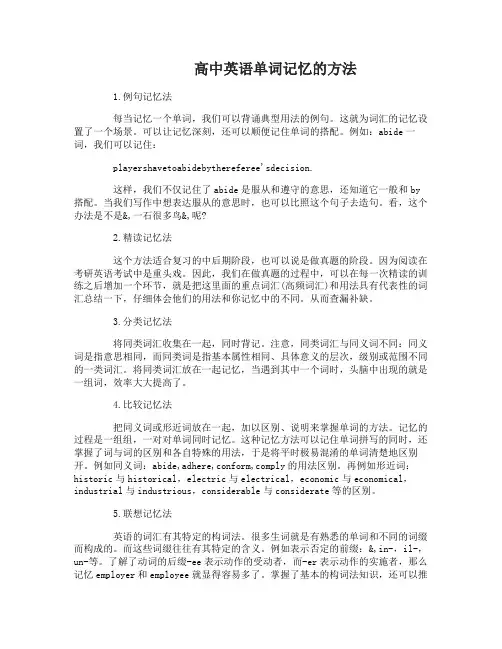
高中英语单词记忆的方法1.例句记忆法每当记忆一个单词,我们可以背诵典型用法的例句。
这就为词汇的记忆设置了一个场景。
可以让记忆深刻,还可以顺便记住单词的搭配。
例如:abide一词,我们可以记住:playershavetoabidebythereferee'sdecision.这样,我们不仅记住了abide是服从和遵守的意思,还知道它一般和by 搭配。
当我们写作中想表达服从的意思时,也可以比照这个句子去造句。
看,这个办法是不是&,一石很多鸟&,呢?2.精读记忆法这个方法适合复习的中后期阶段,也可以说是做真题的阶段。
因为阅读在考研英语考试中是重头戏。
因此,我们在做真题的过程中,可以在每一次精读的训练之后增加一个环节,就是把这里面的重点词汇(高频词汇)和用法具有代表性的词汇总结一下,仔细体会他们的用法和你记忆中的不同。
从而查漏补缺。
3.分类记忆法将同类词汇收集在一起,同时背记。
注意,同类词汇与同义词不同:同义词是指意思相同,而同类词是指基本属性相同、具体意义的层次,级别或范围不同的一类词汇。
将同类词汇放在一起记忆,当遇到其中一个词时,头脑中出现的就是一组词,效率大大提高了。
4.比较记忆法把同义词或形近词放在一起,加以区别、说明来掌握单词的方法。
记忆的过程是一组组,一对对单词同时记忆。
这种记忆方法可以记住单词拼写的同时,还掌握了词与词的区别和各自特殊的用法,于是将平时极易混淆的单词清楚地区别开。
例如同义词:abide,adhere,conform,comply的用法区别。
再例如形近词:historic与historical,electric与electrical,economic与economical,industrial与industrious,considerable与considerate等的区别。
5.联想记忆法英语的词汇有其特定的构词法。
很多生词就是有熟悉的单词和不同的词缀而构成的。

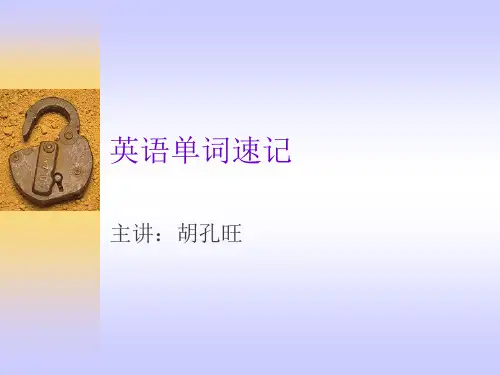
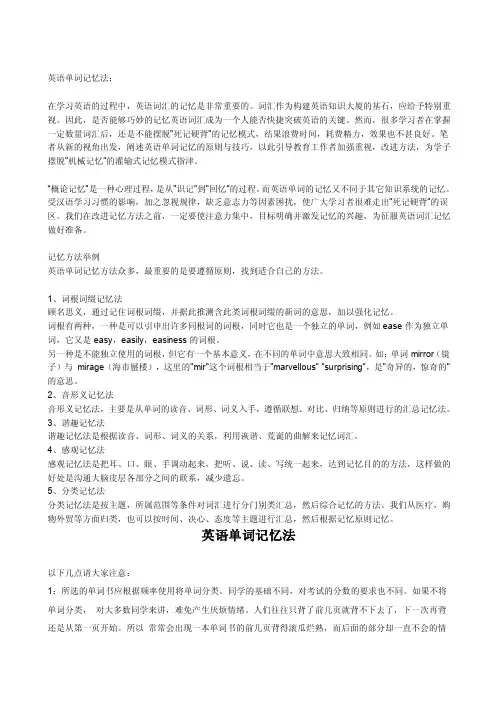
英语单词记忆法:在学习英语的过程中,英语词汇的记忆是非常重要的。
词汇作为构建英语知识大厦的基石,应给予特别重视。
因此,是否能够巧妙的记忆英语词汇成为一个人能否快捷突破英语的关键。
然而,很多学习者在掌握一定数量词汇后,还是不能摆脱"死记硬背"的记忆模式,结果浪费时间,耗费精力,效果也不甚良好。
笔者从新的视角出发,阐述英语单词记忆的原则与技巧,以此引导教育工作者加强重视,改进方法,为学子摆脱"机械记忆"的灌输式记忆模式指津。
“概论记忆”是一种心理过程,是从"识记"到"回忆"的过程。
而英语单词的记忆又不同于其它知识系统的记忆。
受汉语学习习惯的影响,加之忽视规律,缺乏意志力等因素困扰,使广大学习者很难走出"死记硬背"的误区。
我们在改进记忆方法之前,一定要使注意力集中,目标明确并激发记忆的兴趣,为征服英语词汇记忆做好准备。
记忆方法举例英语单词记忆方法众多,最重要的是要遵循原则,找到适合自己的方法。
1、词根词缀记忆法顾名思义,通过记住词根词缀,并据此推测含此类词根词缀的新词的意思,加以强化记忆。
词根有两种,一种是可以引申出许多同根词的词根,同时它也是一个独立的单词,例如ease作为独立单词,它又是easy,easily,easiness的词根。
另一种是不能独立使用的词根,但它有一个基本意义,在不同的单词中意思大致相同。
如:单词mirror(镜子)与mirage(海市蜃楼),这里的"mir"这个词根相当于"marvellous" "surprising",是"奇异的,惊奇的"的意思。
2、音形义记忆法音形义记忆法,主要是从单词的读音、词形、词义入手,遵循联想、对比、归纳等原则进行的汇总记忆法。
3、谐趣记忆法谐趣记忆法是根据读音、词形、词义的关系,利用诙谐、荒诞的曲解来记忆词汇。
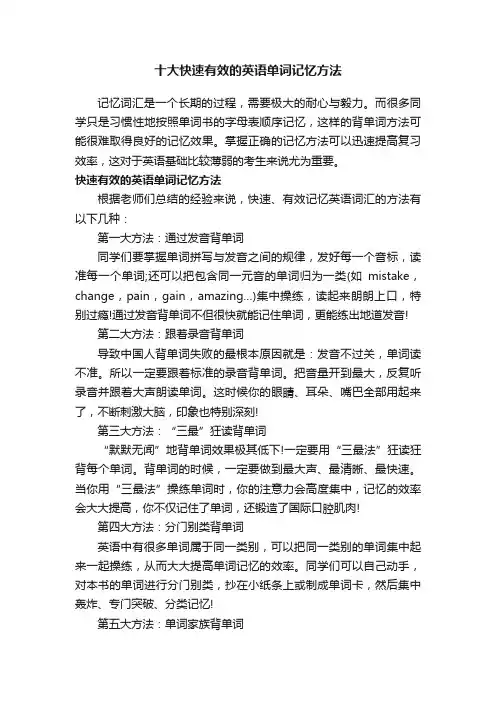
十大快速有效的英语单词记忆方法记忆词汇是一个长期的过程,需要极大的耐心与毅力。
而很多同学只是习惯性地按照单词书的字母表顺序记忆,这样的背单词方法可能很难取得良好的记忆效果。
掌握正确的记忆方法可以迅速提高复习效率,这对于英语基础比较薄弱的考生来说尤为重要。
快速有效的英语单词记忆方法根据老师们总结的经验来说,快速、有效记忆英语词汇的方法有以下几种:第一大方法:通过发音背单词同学们要掌握单词拼写与发音之间的规律,发好每一个音标,读准每一个单词;还可以把包含同一元音的单词归为一类(如mistake,change,pain,gain,amazing…)集中操练,读起来朗朗上口,特别过瘾!通过发音背单词不但很快就能记住单词,更能练出地道发音!第二大方法:跟着录音背单词导致中国人背单词失败的最根本原因就是:发音不过关,单词读不准。
所以一定要跟着标准的录音背单词。
把音量开到最大,反复听录音并跟着大声朗读单词。
这时候你的眼睛、耳朵、嘴巴全部用起来了,不断刺激大脑,印象也特别深刻!第三大方法:“三最”狂读背单词“默默无闻”地背单词效果极其低下!一定要用“三最法”狂读狂背每个单词。
背单词的时候,一定要做到最大声、最清晰、最快速。
当你用“三最法”操练单词时,你的注意力会高度集中,记忆的效率会大大提高,你不仅记住了单词,还锻造了国际口腔肌肉!第四大方法:分门别类背单词英语中有很多单词属于同一类别,可以把同一类别的单词集中起来一起操练,从而大大提高单词记忆的效率。
同学们可以自己动手,对本书的单词进行分门别类,抄在小纸条上或制成单词卡,然后集中轰炸、专门突破、分类记忆!第五大方法:单词家族背单词英语中有很多单词都有整个家族,名词、动词、形容词、副词,加上不同的前缀、后缀就有不同的词性变化、意思变化。
要想彻底掌握一个单词,我们要做的就是:整个家族一锅端!家族内所有的单词全部消灭!通过单词家族可以大大提升背单词的效率。
第六大方法:零碎时间背单词背单词不需要大段大段的整块时间。
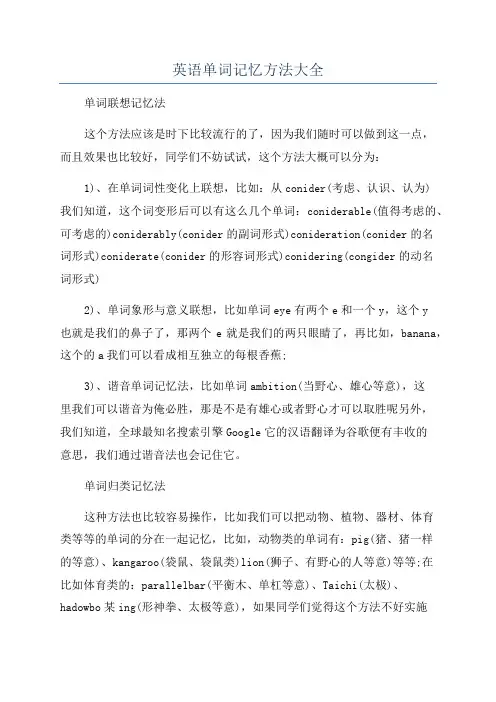
英语单词记忆方法大全单词联想记忆法这个方法应该是时下比较流行的了,因为我们随时可以做到这一点,而且效果也比较好,同学们不妨试试,这个方法大概可以分为:1)、在单词词性变化上联想,比如:从conider(考虑、认识、认为)我们知道,这个词变形后可以有这么几个单词:coniderable(值得考虑的、可考虑的)coniderably(conider的副词形式)conideration(conider的名词形式)coniderate(conider的形容词形式)conidering(congider的动名词形式)2)、单词象形与意义联想,比如单词eye有两个e和一个y,这个y也就是我们的鼻子了,那两个e就是我们的两只眼睛了,再比如,banana,这个的a我们可以看成相互独立的每根香蕉;3)、谐音单词记忆法,比如单词ambition(当野心、雄心等意),这里我们可以谐音为俺必胜,那是不是有雄心或者野心才可以取胜呢另外,我们知道,全球最知名搜索引擎Google它的汉语翻译为谷歌便有丰收的意思,我们通过谐音法也会记住它。
单词归类记忆法这种方法也比较容易操作,比如我们可以把动物、植物、器材、体育类等等的单词的分在一起记忆,比如,动物类的单词有:pig(猪、猪一样的等意)、kangaroo(袋鼠、袋鼠类)lion(狮子、有野心的人等意)等等;在比如体育类的:parallelbar(平衡木、单杠等意)、Taichi(太极)、hadowbo某ing(形神拳、太极等意),如果同学们觉得这个方法不好实施的话,可以找一本相关的字典来参看,这样可以节省很多的时间,因为那上面有很多很明晰的。
词根词缀记忆谐音法示例behind在背后[联想:被害的是在背后]joke笑话[联想:揍客就成了笑话]leave离开[联想:离吾就是离开]自制卡片记忆法这个方法非常实用,我们可以随时携带、随时查看,至于采用怎么样的记忆方法大家可以慢慢,可以按照给出的选择自己合适的,慢慢摸索,只要肯努力,一定可以实现很多。
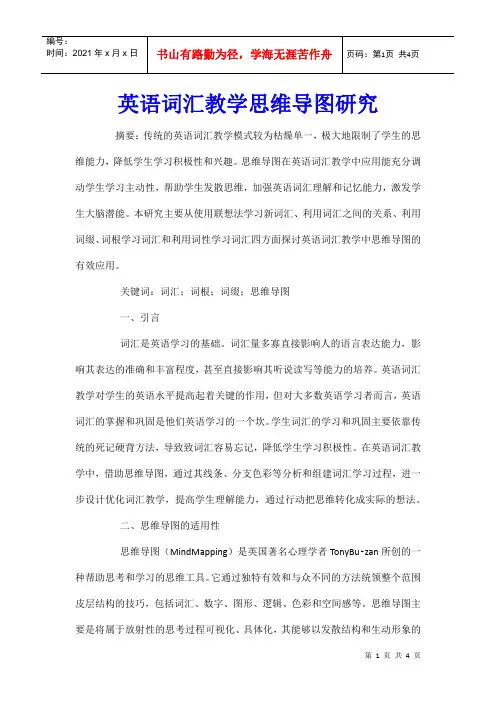
英语词汇教学思维导图研究摘要:传统的英语词汇教学模式较为枯燥单一,极大地限制了学生的思维能力,降低学生学习积极性和兴趣。
思维导图在英语词汇教学中应用能充分调动学生学习主动性,帮助学生发散思维,加强英语词汇理解和记忆能力,激发学生大脑潜能。
本研究主要从使用联想法学习新词汇、利用词汇之间的关系、利用词缀、词根学习词汇和利用词性学习词汇四方面探讨英语词汇教学中思维导图的有效应用。
关键词:词汇;词根;词缀;思维导图一、引言词汇是英语学习的基础。
词汇量多寡直接影响人的语言表达能力,影响其表达的准确和丰富程度,甚至直接影响其听说读写等能力的培养。
英语词汇教学对学生的英语水平提高起着关键的作用,但对大多数英语学习者而言,英语词汇的掌握和巩固是他们英语学习的一个坎。
学生词汇的学习和巩固主要依靠传统的死记硬背方法,导致致词汇容易忘记,降低学生学习积极性。
在英语词汇教学中,借助思维导图,通过其线条、分支色彩等分析和组建词汇学习过程,进一步设计优化词汇教学,提高学生理解能力,通过行动把思维转化成实际的想法。
二、思维导图的适用性思维导图(MindMapping)是英国著名心理学者TonyBu⁃zan所创的一种帮助思考和学习的思维工具。
它通过独特有效和与众不同的方法统领整个范围皮层结构的技巧,包括词汇、数字、图形、逻辑、色彩和空间感等。
思维导图主要是将属于放射性的思考过程可视化、具体化,其能够以发散结构和生动形象的符号等充分调动和协调人的大脑工作效率。
思维导图是一个思维发散的过程,学习者可以借助这一工具回顾思维过程、发散思维、理清思路、加深知识学习理解和记忆。
思维导图的焦点在中心位置,并形成从中心向四周发散扩充出来的自然结构;各分支机构以线条、符号、词汇和图像呈现,遵循基本、自然、简单、容易被大脑接受的规则让各分支节点连接一起,形成整体结构。
思维导图可以把枯燥的变成有层次感、容易记忆的彩色图像,高度吻合我们大脑处事方式,容易激发和发散思维。
英语单词记忆方法—思维导图法(二)说明:本资料包括五个部分的内容即:第一部分概念呈现,利用“图”与“文”先建立第一印象。
第二部分单词资料库,包括单词的基本资料、单词例句、相关单词补充、有趣信息补给等内容。
第三部分思维导图串连,第一层是大主题(Unit),之后是当前单元的小主题。
延伸出去的30条线段,每一条线段都有一个单词,即:大主题→小主题→单词。
第四部分阶段性的小测试,巩固记忆。
第五部分参考答案。
目录:Theme 2 People 人Unit 1 Expression 表达Unit 2 Body 身体Unit 3 Feeling 感觉Unit 4 Relationship 关系Unit 5 Clothes 服装Unit 6 Personality 个性Answer KeyTheme 2 People 人Unit 1 Expression 表达1attract/əˈtrækt/vt. 吸引;引起,诱惑•The flower show attracted large crowds this year. 今年的花展吸引了大批观众。
•attract sb. from sw. 从某处吸引某人•attract one's attention 吸引某人的注意力2oppose/əˈpəuz/vt. 反对;反抗•Quakers strongly oppose violence and war. 教友派信徒们强烈反对暴力和战争。
•oppose (sb./sth.) doing sth.oppose changing the law 反对修改法律3persuade/pəˈsweid/vt. 劝说;说服•She persuaded me to buy it. 她说服我买下了它。
The clerk persuaded me to buy the expensive shoes. 那个店员说服我买那昂贵的鞋。
记忆英语单词诀窍【二】展开全文defect[di5fekt9 5di:fekt]n.;缺点,缺陷,不足记忆方法: de 的 fect 形近 fact"实际" 实际的——太实际的是现在很多人的缺点define[di5fain]vt.给…下定义;限定记忆方法: fine 美好 de 的 define——美好的给生活下定义——美好的definite[5definit]a.明确的;肯定的记忆方法:definite define 给……下定义给它下了定义,所以它是明确的definitely[5definitli]ad.一定地,明确地记忆方法: definite的副词形式definition[9defi5niF[n]n.定义,确实,清晰度记忆方法: define的名词形式—ition是名词后缀表"行为的结果"delete[di5li:t]vt.删除;擦掉记忆方法: 计算机键盘上的"删除"键delicious[di5liF[s]a.美味的,怡人的记忆方法: 底里歇斯——(摇滚乐)歇斯底里, 有些人却视之怡人的美味的delivery[di5liv[ri]n.投递;交付;分娩记忆方法: de得 live活 ry[谐音]累重新组合得到——活得累活的累——要不停的分娩——要不停的投递(送报纸) ——交付(贷款买房) democracy[di5mCkr[si]n.民主,民主制记忆方法: 拉丁词根demo=people 人民拉丁词根cracy=rule 政权人民统治——民主democratic[dem[5krAtik]a.民主的,民主政体的记忆方法: -tic . 形容词后缀dense[dens]a.密集的,稠密的,浓密的记忆方法: 但是——一个人说"但是"太密集, 会引起别人的讨厌density[5densiti]n.密集度,稠密度;记忆方法: [物][化]密度 dense-density -ity名词后缀表"性质depart[di5pa:t]vi.离开,起程;出发记忆方法: 弟怕他——弟弟怕他,一见到他就离开,起程到别的地方departure[di5pa:tF[]n.离开,出发,起程记忆方法: depart + ure(名词后缀表"行为")deposit[di5pCzit]vt.使沉淀;存放记忆方法: posit读音近似"跑累的" "跑累的"——沉淀下来descend[di5send]vi.下来,下降;下倾记忆方法: 地上的——地上的东西从空中会下降desire[di5zai[]vt.渴望;要求 n.愿望记忆方法: de 德国 sir 先生癞蛤蟆想吃天鹅肉德国先生渴望吃天鹅肉 e 鹅desirable[di5zai[r[b[l]a.称心的,合意的,理想的记忆方法: desire + able -able形容词后缀表"可以……的"despair[dis5pZ[]n.绝望 vi.绝望记忆方法: des=destroy 摧毁 pair一对摧毁一对情侣,情侣肯定很绝望destine[5destin]vt.命定,注定;预定记忆方法:destine est 最好的 n男[拼音nan] 即使是最好的男人,也注定要死 destination[9desti5neiF[n]n.目的地,终点记忆方法: destine + ation名词后缀地铁站里可以看到这个词destruction[dis5trQkF[n]n.破坏,毁灭,消灭记忆方法: destroy .v.破坏 destruction n.破坏detect[di5tekt]vt.察觉,发现记忆方法: 弟太渴——我察觉(发现)弟太渴了detection[di5tekF[n]n.察觉,发觉;侦察记忆方法: detect + ion(名词后缀)devil[5dev[l]n.魔鬼,恶魔记忆方法: d e v i l l i v e d 反拼:lived过去住过的魔鬼devise[di5vaiz]vt.设计,发明记忆方法: de-德国 vise-wise 精明的德国精明的——设计和发明diagram[5dai[grAm]n.图解,图表,简图记忆方法: dia读音近似"大一" gram——grammar"语法" 大一的语法——把它制成图表dial[5dai[l]n.钟面;拨号盘 vt.拨记忆方法: 反拼:laid (lay的过去式) dial——laid 对方的手机关机时,你会听到这个单词 "The subscriber you is powered off"dialeddialect[5dai[lekt]n.方言,土语,地方话记忆方法: dia 大一词根lect-speak-lecture 大一我们说话爱用方言diameter[dai5Amit[]n.直径记忆方法: dia-meter 直径一米长dictate[dik5teit]vt.&vi.口授;命令记忆方法: 词根dict—say ate 动词后缀dictation[dik5teiF[n]n.口授笔录,听写记忆方法:dictation diction——dictionary字典口授笔录,不懂的词要查字典differ[5dif[]vi.不同,相异(from);与…意见不同记忆方法: different adj.不同的 differ vi 不同digit[5didVit]n.数字,数位记忆方法: 低级的——数字13被西方人认为是低级的digital[5didVitl]a.数字的,计数的;手指的,指状的记忆方法: —al 形容词后缀这个词只所以也是"手指的"意思是因为小时候我们喜欢用手指数数dim[dim]adj.黯淡的,朦胧的记忆方法: 低迷——暗淡的朦胧的环境让人低迷discard[dis5ka:d]vt.丢弃,抛弃,遗弃记忆方法: disc光碟 card 卡片光碟里的卡片被你丢弃了discharge[dis5tFa:dV]vt.释放;排出 n.释放记忆方法: dis-不 charge 管不管——释放disgust[dis5gQst]n.厌恶,憎恶记忆方法: dis—不 gust该死的不该死的——厌恶,憎恶但还不该死dispose[dis5p[uz]vi.排列,处置,解决记忆方法: dis-不 pose=摆放不再摆放——处置或解决掉disposal[dis5p[uz[l]n.丢掉,处理,销毁记忆方法: dispose的名词形式dispute[di5spju:t]vt. 对……提出质疑记忆方法: dis-apart pute=think 分开思考-把各自思考的意见说出来——争论——对……提出质疑dissolve[di5zClv]vt.使溶解;解散记忆方法: dis-apart solve=loose 松开使松开——消散——溶解distinguish[dis5tiNgwiF]vt.区别,辨别,认别记忆方法: 的士停为谁——为你还是为我——如何区别distress[dis5tres]n.忧虑,悲伤;不幸记忆方法: 弟死确实——弟弟死令他确实很悲伤ditch[ditF]n.沟,沟渠 vt./vi.开渠;筑渠记忆方法: 地渠——沟渠diverse[dai5v[:s]a.不同的,相异的;多种多样的记忆方法: diver 潜水员 se 蛇潜水员拿着多种多样的蛇domestic[d[5mestik]adj.家庭的,家务的;国内的 n.家仆,佣人记忆方法: 词根domes=homes -tic形容词后缀表"属于…….的" 属于家里养的——家庭的,家务的属于家里产的——国内的donkey[5dCNki]n.驴记忆方法: don(done) key(钥匙)做一个钥匙挂在驴脖子上dormitory[5dC:mitri]n.集体寝室;宿舍记忆方法: 捣米饮——在宿舍捣米饮dose[d[us]n.(一次)剂量记忆方法: 都是——这些药都是一次剂量draft[dra:ft]n.草稿;汇票 vt.起草记忆方法: draw 画 ft—福特(拼音fu te) dra—ft 画福特草稿图叫福特——叫福特起草本书序言durable[5dju[r[bl]a.耐久的,耐用的记忆方法: 拉丁dur=last able-形容词后缀duration[dju[5reiF[n]n.待续,持久记忆方法: 拉丁dur=last tion-名词后缀dusk[dQsk]n.薄暮,黄昏,幽暗记忆方法: 打四哥——黄昏前打四哥 dawn 黎明 dusk 黄昏dynamic[dai5nAmik]a.有活力的;动力的记忆方法: dy 大姨 na 奶 mi 米 c 磕(瓜子) 大姨喝了奶, 吃了米, 磕了瓜子后, 有活力的,有动力的.economy[i5kCn[mi]n.经济;节约记忆方法: eco读音近似"一口" no(没有) my(我的) 一口都没有我的——我为老板干了那么多活,老板却一口饭吃都不给我老板也太不懂经济了economical[i:k[5nCmik[l]a.节约的;经济学的记忆方法: economy + cal (形容词后缀)elaborate[i5lAb[rit]a.复杂的;精心制作的记忆方法: e-前缀"加强语气" labor 劳动 ate后缀"使…" 使辛勤劳动——精心制作的eliminate[i5limineit]vt.消灭,消除,排除记忆方法: eliminate e鹅 limit限制 na奶奶奶左手一只鹅右手一只鹅——消灭鹅emerge[i5m[:dV]vi.出现,涌现;冒出记忆方法: 一魔戒——一魔戒出现在你的面前emergency[i5m[:dV[nsi]n.紧急情况,突然事件记忆方法: 一魔戒碎——一魔戒突然碎裂, 表明"紧急情况" enclose[in5kl[uz]vt.围住,圈起;附上记忆方法: en-前缀"使" close封闭,enclose 围住,圈起encounter[in5kaunt[]vt./vi. 遭遇,遇到 n.遭遇冲突;偶然相见 ,记忆方法: en-前缀"使" counter=against对面使面对面——遭遇enforce[in5fC:s]vt.实施,执行;强制记忆方法: en-前缀"使" force 力量使力——实施,执行enlarge[in5la:dV]vt.扩大,扩展;放大记忆方法: en-前缀"使" large 大使大——扩大,扩展;放大ensure[in5Fu[]vt.保证;担保记忆方法: en-前缀"使" 使确定——保证;担保entitle[in5taitl]vt.给…权利(或资格)记忆方法: en-前缀"使" title 头衔;资格使有头衔,资格——给……权利envelope[5env[l[up]n.信封;封套;封皮记忆方法: 【谐音】安慰老婆——写封信安慰老婆equality[i5kwCliti]n.平等,相等记忆方法: e-quality(质量) 鹅的质量与你相等 (请想象一下这只鹅的质量是多大)era[5i:r[]n.时代;时期记忆方法: 反拼:areequation[i5kweiF[n]n.方程(式);等式记忆方法: 一块行——根据方程式咱们一块行走equipment[i5kwipm[nt]n.装备;设备记忆方法: equip + ment名词后缀 equip v.装备,配备estimate[5estimit9 5estimeit]vt.估计,评价 n.估计记忆方法: est-(最高级)最—— est I'm ate 估计我是最能吃的euthanasia[9ju:W[5neizi[]n.无痛楚的死亡;安乐死记忆方法: euEuropean Union 欧盟 eu than asia 在推行安乐死方面欧盟比亚洲先走了一步evaluate[i5vAljueit]vt.估价,估计,评价记忆方法: e + value + ate value 价值 ate动词后缀"使" 使有价值——估价后就有了价值evaporate[i5vAp[reit]vi. 蒸发记忆方法: e + vapor + ate vapor 蒸气 ate动词后缀"使" 使变成蒸气——蒸发eventually[i5ventju[li]ad.终于;最后记忆方法: even + tually evening + actually 夜晚在一天中实际上是最后才到的evolution[9i:v[5lu:F[n]n.开方;(天体的)形成记忆方法: r evolution 革命 evolution 进化,发展 r形似斧头 revolution 比 evolution 多了一把斧头——没有斧头(r)的革命是非暴力革命非暴力革命是革命的进化evolve[i5vClv]v.演化记忆方法: revolve 旋转 evolve 演化演化是以旋转上升的exclaim[iks5kleim]vi.呼喊;惊叫记忆方法: claim 要求;声明 claim—exclaim—exclaimationexclude[iks5klu:d]vt.把……排除在外记忆方法: 请仔细观察下面的变化: v. n. adj. conclude—con clusion—con clusive ex clude —ex clusion —ex clusive (排除) (排除) (排他的,专有的) in(在内)——clude——include ex(在外)——clude——excludeexclusive[iks5klu:siv]adj. 排他的,专有的记忆方法: exclude 的形容词形式execute[5eksikju:t]vt.将…处死;实施记忆方法: exe-exercise 练习 cut 切 e 鹅练习切鹅——将鹅处死executive[ig5zekjutiv]a.执行的 n.执行者记忆方法: execute + I've 我已经处死它,我是执行者exertion[ig5z[:F[n]n.尽(力),运用记忆方法: 一个热心(肠)——尽力运用一个热心肠去做些事情exert[ig5z[:t]vt.尽(力),运用记忆方法: xertion的动词形式expand[ik5spAnd]vt.张开; 膨胀; 扩大记忆方法: 一个使胖的——一个使胖的方法——膨胀expansion[ik5spAnF[n]n.扩张;膨胀记忆方法: 一个使胖身——膨胀explanation[ekspl[5neiF[n]n.解释,说明;辩解记忆方法: explain的名词形式 expla[in] + nationexplode[ik5spl[ud]v.爆炸,爆破记忆方法: ex-out plode拟声"扑通" 向外"扑通"一声——爆炸 v. n. adj. conclude—conclusion—conclusive explode —explosion— explosiveexplosion[iks5pl[uV[n]n.爆炸,爆发,炸裂 n.炸药 a.爆炸的explosive[iks5pl[usiv]export[ik5spC:t]vt.输出出口 n.输出品,输出,出口记忆方法: ex-out port 跑的向外跑的——输出exposure[ik5sp[uV[]n.暴露,揭露;曝光记忆方法: 一刻识破了——暴露,揭露exterior[eks5ti[ri[]a.外部的;对外的记忆方法: in(向里) + terior ex(向外) + teriorexternal[eks5t[:nl]a.外部的,外面的记忆方法: ex-out 请把exterior & external 对比记忆fabric[5fAbrik]n.织物,纺织品;结构记忆方法: fa:发现 bric——brick:砖头发现砖头——纺织品里发现一块砖头facility[f[5siliti]n.[常pl.]设备,设施;便利,容易记忆方法: 发现水利的——发现水利的设施,设备factor[5fAkt[]n.因素 ; 要素记忆方法: fact + or & f + actorfaculty[5fAk[lti]n. 全体人员,本领记忆方法: 坏课题——全体人员用本领做这个坏课题famine[5fAmin]n.饥荒;严重的缺乏记忆方法: fa:罚 mine 我的罚我的——罚我的钱,让我饥荒fare[fZ[]n.车费,船费,票价记忆方法: 【谐音】费儿——什么费儿——车费或船费fashion[5fAF[n]n.样子,方式;时尚记忆方法: 翻新——翻新方式即时尚fashionable[5fAF[n[bl]a.流行的,时髦的记忆方法: fashion 的形容词fatal[5feitl]a.致命的;命运的记忆方法: 肥头——头太肥是致命的fatigue[5f[5ti:g]n.疲劳记忆方法: 肥胖的体格——肥胖的体格,动一动就疲劳faulty[5fC:lti]a.有错误的,有缺点的记忆方法: fault 错误 faulty 有错误的fee[fi:]n. 车费,服务费记忆方法: fee[谐音]费——车费,服务费feedback[5fi:dbAk]n.反馈记忆方法: feed 喂 back 后喂养后得到反馈妈喂儿张大,儿张大喂妈——反馈fertile[5f[:tail]a.肥沃的;多产的记忆方法: [谐音]佛塔——建在肥沃的土地上festival[5fest[v[l]n.节日;节日的记忆方法: fest——fast 节日总是过得太快fiber[5faib[]n.纤维,质地,本质记忆方法: 飞吧——纤维,飞吧fierce[fi[s]a.凶猛的,狂热的记忆方法: 飞蛾死——凶猛的飞蛾死filter[5filt[]vt.过滤 n.滤纸记忆方法: 飞的——会飞的滤纸fine[fain]a.美好的;纤细的记忆方法: 美好的身材是纤细的flame[fleim]n.火焰;光辉;热情记忆方法: 飞来——火焰向我(me)飞来flee[fli:]vi./vt.(fled,fled)逃离;逃避记忆方法: 狐狸——狐狸逃离了fleet[fli:t]n.舰队;船队,军舰记忆方法: 坐军舰逃跑flock[flCk]n.羊群,群;大量记忆方法: f (飞) lock(锁) ——飞锁系在羊身上fluid[5flu(:)id]n.流体,液体记忆方法: 弗洛伊德——弗洛伊德的理论流传深远,像流体一样流遍了整个世界forbid[f[5bid]vt.禁止,不许;阻止记忆方法: 【谐音】货币的——禁止货币的流通forecast[5fC:ka:st]vt.预测,预报;预示记忆方法: fore——be fore (向前) cast——broadcast广播在之前广播——预测;预报forge[fC:dV]vt.锻造,锤炼记忆方法: for(为了) ge(格格) 为了保护格格们,锻造自己这个单词可以联想《还珠格格》former[5fC:m[]a.在前的,以前的记忆方法: n.前者 for + me + r 前者(在前的)给我准备一把斧头formula[5fC:mjul[]n.公式; 配方; 原则记忆方法: for:为了 mula:谬论为了谬论不讲原则forth[fC:W]ad.向前;向外,往外记忆方法: for:为了 th(死) 向前送死fortnight[5fC:tnait]n.两星期,十四天记忆方法: fort——fourteen night 40个夜晚就是两星期个夜晚fountain[5fauntin]n.泉水,喷泉;源泉记忆方法: 房厅——房厅里有泉水fraction[5frAkF[n]n.小部分;分数记忆方法: fr(自由的) action(行动) 自由的行动——有小部分人爱自由的行动fragment[5frAgm[nt]vt.使成碎片,使分裂记忆方法: fragm nt我们的年龄成了碎片, 一点点都消失了eframe[freim]n.构架,框架记忆方法: fr—free A me 自由泳获金牌的我被挂在框架里framework[5freimw[:k]n.框架,构架,结构记忆方法: frame + workfrank[frANk]a.坦率的,真诚的记忆方法: 福兰克(人名Frank)是一个坦率的人freight[freit]n.货运;货物;运费记忆方法: fright 受惊 frighten使惊讶freight ——货运的鹅很害怕 fr + eight frequent[5fri:kw[nt]a.时常发生的;经常的记忆方法: fre(自由) quent(困的) 太自由容易困——这种现象时常发生friction[5frikF[n]n.摩擦(力);不和,倾轧记忆方法: fri—free(自由) ction—action(行为) 摩擦力就是阻碍自由的行为frontier[5frQntj[]n.边境;边疆;新领域记忆方法: front + ier[谐音]耳边境的卫士就是国家边疆前线的耳朵frost[frCst]n.冰冻,严寒;霜记忆方法: 丰饶的——这场冰冻回报是丰饶的 (东北有冰的经济——冰雕,滑冰)fuel[fju[l]n.燃料 vt.给…加燃料记忆方法: 【谐音】费油——石油是燃料——费油就是费燃料fulfil[ful5fil]vt.履行;满足;完成记忆方法: full + fill 履行付费- 使人满足男孩和女孩去吃东西, 男孩有履行付费让女孩满足的义务gallon[5gAl[n]n.加仑记忆方法: 音译词 g + all + ongang[gAN]n.一群(伙,组,套)记忆方法: g——哥前面一个哥,后面一个哥, 中间还有一个——一群哥gauge[geidV]vt.量,测量记忆方法: gauge [谐音]古埃及全世界都在测量古埃及金字塔的高度[gi[]n.齿轮,传动装置记忆方法: gear 齿轮夹住耳朵germany[5dV[:m[ni]n.德意志,德国记忆方法: 【谐音】折磨你——德国是两次世界大战的发起国, 就喜欢折磨人global[5gl[ub[l]a.球形的,球面的;世界的;普遍的记忆方法: 【谐音】哥伦布——哥伦布发现地球是球形的glove[glQv]n.手套记忆方法: g(哥) love(爱) 哥哥爱手套grain[5grein]n.谷物,谷粒;颗粒记忆方法: g(怪) + rain——怪雨:谷粒雨gramme[grAm]n.克(重量单位)记忆方法: 与grammar进行对比记忆grant[gra:nt]n.授予物,拨款 vt.给予;准许记忆方法: gr:great ant 大蚂蚁拨款 grant 特(te)许 grand 大(da)的[greip]n.葡萄;葡萄藤记忆方法: gr:great ape:apple 大苹果一样大的葡萄你吃过吗?graph[grAf]n.图表,曲线图记忆方法: photograph——graph 照片图表grateful[5greitful]a.感激的;感谢的记忆方法: gr(great) + ate + ful 别人请你大吃一顿,你很感激的gratitude[5grAtitju:d]a.感激,感谢,感恩记忆方法: gr + at(t)itude 大态度——感激对人生的大态度就是感激人生grave[greiv]a.重大的;严肃的,庄重的n.坟墓记忆方法: brave 勇敢的,不(b)怕的, grave重大的(great)greedy[5gri:di]a.贪吃的;贪婪的记忆方法: 画线部分反写:deer 贪吃的鹿grip[grip]vt./n.紧握,紧夹;掌握,控制记忆方法: 反写:pirg r——斧头猪腿里紧夹着一柄斧头groomn.新郎记忆方法: groom 新郎走进房间guarantee[9gAr[n5ti:]n./vt.保证,担保,保修记忆方法: guar(guard) + ant + ee 守卫保证蚂蚁一个一个(ee)进来guidance[5gaid[ns]n.引导,指导,领导记忆方法: guide(指导) + ance(名词后缀) gui(鬼) dance(跳舞) 鬼指导灵魂跳舞gum[gQm]n.口香糖;树胶记忆方法: gun & gum 枪口被口香糖堵住了hardware[5ha:dwZ[]n.五金器具;硬件记忆方法: ware [wZ[] n.商品,货物;物品 hard +ware硬商品——五金器具hardship[5ha:dFip]n.艰难,困苦记忆方法: hard 困难 ship船船之所以困难因为身陷困境harmony[5ha:m[ni]n. 调合,协调,和谐记忆方法: harm(伤害)+ on + y(你) 有些事,你不协调好,它将对你有伤害harness[5ha:nis]vt.治理 n.马具,挽具记忆方法: 害你死——治理你就是害你死,其方法是把马具放在你身上骑死你harsh[ha:F]a.刺耳的,严厉的记忆方法: 哈欠——听过刺耳的哈欠吗?haste[heist]n.急速,急忙;草率记忆方法:haste hatred[5heitrid]帽子里一条蛇急速爬出n.憎恶,憎恨,仇恨记忆方法: hat+red 1, 小红帽憎恶谁 2, 戴红色帽子表示有仇恨heading[5hediN]n.标题,题词,题名记忆方法: 球迷把标题写在头上headline[5hedlain]n.大字标题;新闻提要记忆方法: 文章头一排字——大字标题headquarters[5hed5kwC:t[z]n.司令部;总部记忆方法: head+quarters(1/4) 头子的1/4在司令部,其余上战场heap[hi:p]n.(一)堆;大量;许多记忆方法: 黑铺——把许多"黑铺"烧成一堆灰hedge[hedV]n.篱笆,树篱;障碍物记忆方法:H形似树篱 heel[hi:l]edge边缘菜地边缘设置了篱笆n.脚后跟,踵,后跟记忆方法: 黑了——脚后跟黑了请对照:feel感到 reel绕 peel皮helicopter[5helikCpt[]n.直升机记忆方法: 【谐音】哈里伯特——哈里伯特坐直升机来中国herd[h[:d]n.兽群;牧群 vt.放牧记忆方法: herd her + d 她的兽群 shed she + d 她的小屋heroic[hi5r[uik]a.英雄的;英勇的记忆方法: hero(英雄) + ic(I see) 我在英雄身上看到了英勇的形象hesitate[5heziteit]vi.踌躇;犹豫记忆方法: he sit ate 他坐也不是,吃也不是,真是犹豫不决hint[hint]n.暗示,迹象记忆方法: hint——hit(打) + n(你)hint holy[5h[uli]打你一下给你点暗示a.神圣的;圣洁的记忆方法: 【谐音】好累——假装神圣的人内心是好累的hook[huk]vt.用钩连接,用钩挂记忆方法: 胡克钩弹簧(中学物理胡克定理) 钓鱼钩到一本书(book) hook book lookhorn[hC:n]n.喇叭;号角记忆方法: 号——号角humble[5hQmbl]a.谦逊的;地位低下的记忆方法: hum-human ble能人能谦虚的并不表示地位低下hydrogen[5haidridV[n]n.氢记忆方法: 害(怕)拘谨——氢害(怕)拘谨identical[ai5dentik[l]a.同一的;恒等的记忆方法: I d en ti cal—— I(我) d(的) en(english) ti(题)cal(库) 我的英语题库与考试题恒等的所以我的英语成绩都是一样的:100分idle[5aidl]a.空闲的;懒散的记忆方法: 爱斗——爱斗的人是因为懒散之故ignore[ig5nC:]vt.不顾,不理,忽视记忆方法: 【谐音】一个闹——一个人在闹,不理他imaginary[i5mAdVin[ri]a.想象中的,假想的记忆方法: imagine:想象 ary:形容词后缀imitate[5imiteit]vt.模仿,仿效;仿制,仿造记忆方法: I'm it ate 我被它吃掉——这个句子有语法错误千万别模仿!immense[i5mens]a.极大的,无边的记忆方法: 一 men 死人一死就去往极大世界immigrant[5imigr[nt]a.移民的,侨民的n.移民,侨民记忆方法: immi[谐音]移民 grant准许准许移民implication[impli5keiF[n]n.含义,暗示,暗指记忆方法: 一摸玻璃开心——一摸玻璃暗示开心imply[im5plai]vt.暗示,意指记忆方法: 对照:reply回答 imply暗示 imply 是 implication 的动词形式import[im5pC:t 5impC:t]vt.&n.输入,进口记忆方法: important ——import 重要的东西才会进口impose[im5p[uz]vi.利用;欺骗记忆方法: I'm pose ——欺骗(其实I'm pose)incline[in5klain]n.斜坡 vt.使倾斜记忆方法: 斜坡里面字母c, 斜坡上面一条线 l i nceindication[indi5keiF[n]n.指示;表示;表明记忆方法: 因地开心——因地制宜就是表明要因地开心inevitable[in5evit[bl]a.不可避免的,必然的记忆方法: 《最后的晚餐》画里(in) 耶酥安慰(evi) 桌(table)旁的门徒,我被出卖是不可避免的infect[in5fekt]vt.传染;感染记忆方法: in fect in fact 实际上实际上,他被感染了非典infer[in5f[:]vt.推论,推断;猜想记忆方法: 【谐音】因祸(得福)——塞翁失马的推论inferior[in5fi[ri[]n.下级;晚辈,次品记忆方法: 对比记忆inferior interiorinfinite[5infinit]n.无限;无穷(大)记忆方法:in-finite 它的内心真美好,心灵美才是无限美 inhabitant [in5hAbit[nt]n.居民,住户记忆方法: in-habit-ant兔子肚里有个居民——蚂蚁inherit[in5herit]vt.继承(传统等)记忆方法: in-her-it it指狗在她家里狗获得了继承权injure[5indV[]vt.伤害,损害,损伤记忆方法: 硬结——器官硬结,器官被伤害了injury[5indV[ri]n.损害,伤害;受伤处记忆方法: injure名词形式:injuryinnocent[5in[snt]a.清白的,幼稚的记忆方法: in no cent 作官的口袋里没有一分钱,我们说他是清白的也有人说他是幼稚的inquire[in5kwai[]vt.打听,询问;调查记忆方法: in(在里面) quire(快点) 在里面快点打听install[in5stC:l]vt.安装,设置记忆方法: in store ——在店里安装installation[inst[5leiF[n]n.安装;装置;设施记忆方法: install + ation(名词后缀)instinct[5instiNkt]n.本能;直觉;生性记忆方法:instinsult[in5sQlt]c 这个单词你的直觉告诉你有两个intin tvt.&n.侮辱,凌辱记忆方法: 硬杀他——用侮辱的方式硬杀他insure[in5Fu[]vt.给…保险;确保记忆方法: insure在确信里面——确保insurance[in5Fu[r[ns]n.保险;保险费记忆方法: insure——insurance Ping An Insurance平安保险intense[in5tens]a.强烈的;紧张的记忆方法: in ten se(蛇) 十条蛇在里面强烈的扭动,谁看到谁紧张interior[in5ti[ri[]n.内部 a.内部的记忆方法: in(向里) + terior内部的 ex(向外) + terior外部的intimate[5intimit]a.亲密的;个人的记忆方法:intimate周末里的大学生, 有情人的及时在过亲密的时光无情人的及时在过个人的时光invade[in5veid]vt. 入侵,侵略;侵袭记忆方法: in 里 vade [谐音]外的从里朝外的——对外的侵略invasion[in5veiV[n]n.入侵,侵略;侵犯记忆方法: invade的名词形式invest[in5vest]vt.投资;投入记忆方法: in + vest――rest 钱在里面休息——投资investment[in5vestm[nt]n.投资,投资额,投入记忆方法: ment——名词后缀issue[5iFu:]n.问题;发行 vt.发行记忆方法: 【谐音】一宿——这个问题被争论了一宿kettle[5ketl]n.水壶,水锅记忆方法: 开头——电影开头一个水壶特写lag[lAg]vi.走得慢 n.落后记忆方法: l(拉) + Ag (化学元素"银") 拉一车的银子——走得慢——落后lane[lein]n.(乡间)小路;跑道记忆方法: 莱茵——莱茵河流过乡间小路lap[lAp]n.膝部;一圈记忆方法: 来吧——用膝打我吧单词反写——pal:伙伴,好友[5leiz[]n.激光记忆方法: 来热——激光一照,肯定来热lavatory[5lAv[t[ri]n.盥洗室,厕所记忆方法: lava――拉我 tory――story故事拉我讲故事在厕所里lawn[lC:n]n.草地,草坪,草场记忆方法: 草地上有个门" ", 门上写着法律(law)"不准踏草地"nlayer[5lei[]n.层,层次;铺设者记忆方法: 来呀——层层铺设layout[5leiaut]n.布局,安排,设计 n.布局,安排,设计记忆方法: lay 放置 out 在……外面这种布局要放到外面leak[li:k]n.漏洞,漏隙,记忆方法: 立刻——立刻把漏洞堵上 weak / peak 顶点 / beak 鸟兽的嘴lens[lenz]n.透镜,镜片;镜头记忆方法: 拦死——看到偷拍你的人,把摄影机的透镜拦死[5li:v[]n.途径,工具,手段记忆方法: l (形似棍棒)+ ever(曾经) 曾经玩棍棒——这是六小灵童成功的途径liable[5lai[bl]a.易于…的;可能的记忆方法: li(力) + able(能)力所能及——可能的liberal[5lib[r[l]a.心胸宽大的;慷慨的记忆方法: 里薄弱——表面心胸宽大的,其实里面薄弱liberty[5lib[ti]n.自由;释放;许可记忆方法: 李白踢(人)——被抓没了自由license[5lais[ns]n.许可;执照 vt.准许记忆方法: 来审视——经营执照每年都要经工商局来审视limb[lim]n.分支,突出物记忆方法: 累吗?——那么多分支你处理,累吗?lime[laim]n.石灰记忆方法: li里 me我我肚子里满是石灰limitation[limi5teiF[n]n.限制;限度,局限记忆方法: limit限制 + ation名词后缀。
12种常用英语单词实用记忆方法在英语界,有一个很普遍的说法就是,得单词者得英语天下.从这一个角度来看,英语单词是在英语学习的过程中是非常重要的.在这里,我想给大家分享一下,我学习英语过程中的一些经验和心得体会.(我这些方法适合于想主动提高英语成绩的人.对于那些被动学习的人的话,其实再好的方法他们也很难坚持.)1. 用单司读音记单词-适合于单语较长且读音响亮,或读音比较有特点的单词. 1)比如:proud 自豪的; 骄傲的;等这个单词的读音为[praʊd] 读这个单词时,这种自豪和骄傲的气势就能充分地表现出来;2)比如:hamburger, ['hæmbə:gə] ,这个单词的字母较多,且汉语表达听起来虽然跟单词本身的意思很接近,但却是不完全一样.如果按平常的记忆方法来记单词,很容易弄错读音.如果用读音来讲单单词,效果会好很多.2.自编故事记忆法. 比如,出国留学生考的托福和雅思英语.那些英语词汇都不是我们常用的词汇,而是各个专业领域中的一些专业词汇或生活在国外的一些生活俚语,其生僻程度可想而知.按有些留学过来人的话来说就是,有相当一些词汇就可能在考试的时候能见到,平时一辈子都有可能见不到. 我听过一些培训托福、雅思的老师的课. 我当时被那些老师的方法和效果给震撼了.当她们见到任何一张单词汇,她们都可以在短时间编一个故事,把这些单词给紧密联系起来,这样就可以让学生快速、准确地掌握这些单词.当然,这些故事用语有些很不文明,有些可能会用脏的语言在骂自己,但这只是用来记单词的一种手段而已,无关其它问题. 在这里我不是建议大家完全去学模仿这种做法,但自己编故事,让自己能更快速、更准确地记忆单词确实是一个好方法. 另外要注意的一点就是,不能因为编故事把单词本身的读音和意思弄歪曲了.比如如wall墙壁,wallet钱包.在字形上,前面都有wall,一个有llet,而另外一个没有,为了更好的记忆这两个单词,我们可以用一句话的短故事把它们联系起来。
13种记忆单词方法单词是构成语言的三大要素之一,是语言的“建筑材料”,是构建英语知识大厦的基石。
在整个英语学习过程中,单词学习的任务是最繁重的。
单词掌握多少和熟练程度直接影响运用语言表达思想的准确性, 单词量的多少也直接影响着学生的各方面的能力。
从某个角度上看,学生在英语学习中掉队,往往是从记不住单词开始的,单词的重要性就不言而喻了。
因此,是否能够巧妙的记忆英语单词成为一个人能否快捷突破英语的关键。
下面就介绍几种简单有效的英语单词记忆方法。
一、运用读音规则记忆法英语是拼音文字,根据英语这一特点,使语音与单词中的字母有机的结合,以增强单词的记忆。
就是利用英语国际音标来识记单词。
国际音标是标识标记英语语音的符号系统。
如果熟悉并掌握国际音标及规则字母、字母组合的发音,就可以根据音标来直接拼写英语单词,尤其是一些比较长又难于识记的单词.例如:pronunciation (n. 发音),就可以根据其音标来正确书写单词。
单词的读音与字母及其组合的发音之间又有着密切的联系。
比如:cow,how,now 等词中的字母组合ow 都发/au/ 这个音;cake,these,five,note 等词中的元音字母都发该字母名称音等。
对于一些长串字母组成的单词,可采用按读音分节的方法进行记忆。
如:computer可分为com/k?m/、pu/pju:/、ter/t?/三部分,important可分为im/im/、por/p /、tant/tnt/三个部分。
英语单词之间有时候读音完全相同或极为相似,这样一来,我们可以通过比较、观察,找出它们的同异之处,来进一步加深印象,增强记忆效果。
例如:/tu:/-two, too /si:/-sea, see /mi:t/ -meet, meat /f :/-for, four/ raIt/-right, write英语中有些单词的读音被直接替换成了汉语词汇,这是因为起先在汉语中还没有跟这个单词相对应的词汇,掌握音译词后,我们就很快根据读音记住这个单词了。
初中一年级单词(2)sock[ ]n.短袜分析:so——如此;ck——“刺客”的拼音首字母;记忆方法:穿着如此短袜的刺客sweater[ 'swet? ]n.毛衣分析:swear—穿的意思,te—特(别)的拼音;记忆方法:(妈妈给买的)毛衣穿在身上特别暖和啊!skirt[ ]n.裙子分析:skirt——衬衫(shirt)的近似拼写;k——“可”的拼音首字母;记忆方法:男孩穿衬衫,女孩穿可爱的裙子;sale[ seil ]n.出售:廉价销售分析:sa --- 傻的近似拼音,le --- 了记忆方法:商家廉价出售了那些好东西,真是傻了。
dollar[ ] n.美元分析:”多了”的谐音;记忆方法:我的美元太多了。
color [ ]n.——颜色分析:co——可乐(cola)的简写;lo——像数字10;r——外形像小草;记忆方法:让我们用可乐来给这10棵小草涂上颜色吧。
welcome[ ]不必客气的;受欢迎的分析:wel --- well 近似,”好”的意;come ---来记忆方法:最好是你来,因为你很受欢迎。
example[ ig'zɑ:mpl ]n.例子;实例分析:exam --- 测验;p --- “怕”的拼音首字母;le——”了”的拼音;记忆方法:老是用这些例子来做测验,我们都考怕了。
store[ ] n.商店分析:st --- 石头;or ---- 或者;e 鹅记忆方法:这里的商店很奇怪,卖的是石头或者大白鹅。
price[ prais ]n.价格分析:pr——“胖人”的拼音首字母;ice——冰块;记忆方法:这个胖人卖的冰块价格很高。
afford[ ]v.负担得起;买得起分析:a--- 一把;f--- 外形像拐杖;for---为了;d——”弟”的拼音首字母;记忆方法:一把拐杖我是买得起的,更何况是为了我弟弟。
January[ ]n.一月分析:“见了你”的谐音;记忆方法:一月他第一次遇见了你February[ ] n.二月分析:fe——“非”的拼音;bruary——“不如你”的谐音;记忆方法:二月他非说别人不如你March[ ]n.三月分析:“马车”的谐音;记忆方法:三月坐三轮马车来接你April[ ] n.四月分析:ap——“阿婆”的拼音首字母;ril——“日历”的拼音;记忆方法:四月私下找阿婆看日历May [ mei, me ]n. 五月分析:may——“蚂蚁”拼音;记忆方法:五月在他屋里发现蚂蚁June [ ] n. 六月分析:jun——“君”的拼音;记忆方法:六月柳树下说他是君子July [ ] n.七月分析:jul——“距离”的拼音;记忆方法:七月起两人变得没有距离August[ ]n.八月分析:augu——“一古”的谐音;st——“试题”的拼音首字母;记忆方法:八月爸爸给他一份古老的试题September [ ]n.九月分析:septem——“色贪”的谐音;ber——“吧”的谐音;记忆方法:九月舅舅才发现他又色又贪吧?October[ ]n.十月分析:octo——“呕吐”的谐音;ber——“吧”的谐音;记忆方法:十月开始他已变得令人呕吐吧?November[ ]n.十一月分析:no——没有;ver——“玩”的谐音;ber——“吧”的谐音;记忆方法:十一月已经没有在一起玩了吧?December [ ]n. 十二月分析:de——“底”的谐音;cem——“散”的谐音;ber——“吧”的谐音;记忆方法:到了十二月两人彻底解散了吧?contest[ ] v.竞争;竞赛;比赛分析:con --- “啃”的谐音;test --- 测试,测验记忆方法:今年竞赛 / 比赛的项目是啃测试的卷子。
英语单词记忆方法—思维导图法(二)说明:本资料包括五个部分的内容即:第一部分概念呈现,利用“图”与“文”先建立第一印象。
第二部分单词资料库,包括单词的基本资料、单词例句、相关单词补充、有趣信息补给等内容。
第三部分思维导图串连,第一层是大主题(Unit),之后是当前单元的小主题。
延伸出去的30条线段,每一条线段都有一个单词,即:大主题→小主题→单词。
第四部分阶段性的小测试,巩固记忆。
第五部分参考答案。
目录:Theme 2 People 人Unit 1 Expression 表达Unit 2 Body 身体Unit 3 Feeling 感觉Unit 4 Relationship 关系Unit 5 Clothes 服装Unit 6 Personality 个性Answer KeyTheme 2 People 人Unit 1 Expression 表达1attract/əˈtrækt/vt. 吸引;引起,诱惑•The flower show attracted large crowds this year. 今年的花展吸引了大批观众。
•attract sb. from sw. 从某处吸引某人•attract one's attention 吸引某人的注意力2oppose/əˈpəuz/vt. 反对;反抗•Quakers strongly oppose violence and war. 教友派信徒们强烈反对暴力和战争。
•oppose (sb./sth.) doing sth.oppose changing the law 反对修改法律3persuade/pəˈsweid/vt. 劝说;说服•She persuaded me to buy it. 她说服我买下了它。
The clerk persuaded me to buy the expensive shoes. 那个店员说服我买那昂贵的鞋。
•persuade sb. (to do sth.) 说服某人(做某事)•persuade sb. into (doing) sth. 说服某人(做某事)4convince/kənˈvins/vt. 使确信,使信服•I was convinced that Peter knew the fact, but he didn't tell us. 我确信皮特知道事实,但他没有告诉我们。
•persuade & convince: 两个词通常可互为同义词,但前者主要的意思是给别人好的理由让他们同意去做某件事,后者主要的意思是让某人相信某事是正确的。
5promise/ˈprɔmis/n. 诺言v t. vi. 答应•Give me your promise that you won't make the same mistake again. 跟我保证你不会再犯同样的错。
•I (can) promise you 我可以跟你保证•promise to do sth. 答应做某事•keep one's promise 履行诺言6understand/ˌʌndəˈstænd/vt. 懂;获悉v i. 懂得•I don't understand what you are saying. 我不知道你在说什么。
•understand each other 彼此理解•make sb. understand sth. 使某人理解某事7imitate/ˈimiteit/vt. 模仿,仿效;仿制•He can imitate his teacher perfectly. 他能惟妙惟肖地模仿他的老师。
【同】follow, mimic, mock【反】invent8prefer/priˈfə:/vt. 宁可,宁愿•Brandon prefers not to think about the future. 布兰登宁可先不去想未来的事。
•prefer sth. 比较喜欢某东西•prefer sb. not to do sth. 宁愿某人不做某事9express/iksˈpres/vt. 表示n. 快车,快递•I can't express how grateful I am. 我说不出我有多么感激。
•express one's satisfaction 表示对……的满意10fascinate/ˈfæsineit/vt. 迷住v i. 迷人•The students were fascinated by his ideas. 学生们都被他的思想吸引住了。
【同】tempt, charm, capture【反】bore11beguile/biˈgail/v. 欺骗,诱骗•Bill beguiled me into lending him my bicycle. 比尔骗我把自行车借给了他。
•beguile sb. (into doing sth.) 骗某人做某事•be beguiled by one's appearance 被某人的外表所欺骗12inspire/inˈspaiə/vt. 鼓舞;给……以灵感•The story inspired us to chase our own dreams bravely. 那故事鼓舞了我们勇敢追求我们自己的梦想。
inspiration n. 鼓舞【同】encourage, urge, stimulate13thank/θæŋk/v.谢谢•Thank you all the same. 不管怎样,还是要谢谢你。
•Thanks for asking me. 谢谢你请我。
•Thank you for having me. 谢谢你邀请我。
14attempt/əˈtempt/vt. 尝试,试图n. 企图•My first attempt at a chocolate cake tasted horrible. 我首次试做的巧克力蛋糕难吃极了。
•make an attempt at sth. 试图、企图、打算某事•make an attempt to do sth. 试图、力图、努力去做某事15scream/skri:m/vi. 尖叫;呼啸•The boy was screaming with pain. 这男孩痛得尖叫起来。
•scream for 强烈要求•scream out 大叫•screamer 惊叹号16regret/riˈɡret/vt. vi. 遗憾,抱歉•We informed her with regret of our decision. 我们遗憾地把我们的决定通知她。
•He regretted not having studied harder. 他后悔没有更加用功地学习。
•We regret that we are not able to help you. 我们后悔我们没能帮你。
17encourage/inˈkʌridʒ/vt. 鼓励,支援,助长•Her success encouraged me to try the same thing. 她的成功鼓励我试做同样的事。
•encourage sb. to do sth. 鼓励某人做某事•encourage sb. 激励某人18explain/iksˈplein/vt. vi. 解释,说明•She explained her conduct to her boss. 她向老板说明了自己那种表现的原因。
•explain sth. to sb. 给某人解释某事•explain to sb. 向某人解释19fear/fiə/n. 害怕;担心v t. 害怕•She has a great fear of fire. 她对火有恐惧感。
•shock with fear 吓一大跳,震惊•in fear of 怕•without fear or favor 公正地20praise/praise/vt. n. 赞扬,表扬•The teacher praised her for her courage. 老师赞扬了她的勇气。
•Praise makes good men better and bad men worse. 赞美使好人更好,坏人更坏。
•Everyone praised the book. 每个人都称赞这本书。
21tribute/ˈtribju:t/n. 贡物;献礼,贡献•Many Greek cities had to send yearly tribute to Athens. 许多希腊城市不得不每年向雅典进贡。
【同】praise, credit, commendation22gratitude/ˈɡrætitju:d/n. 感激,感谢,感恩•We owe you a debt of gratitude for your help. 对于你的帮忙,我们感恩不尽。
【同】thankfulness, appreciation23appreciate/əˈpri:ʃieit/vt. 感激;欣赏•His talent for sport was not appreciated at first. 他的运动才能起初没有获得欣赏。
•appreciate sb. doing sth. 感谢某人做某事【同】admire 【反】despise, depreciate24affliction/əˈflikʃən/n. 痛苦,折磨•His stomachache is a great affliction to him. 胃痛对他来说是个很大的折磨。
•→afflict vt.使痛苦,折磨•→afflictive adj.令人痛苦的;难受的25astonish/əsˈtɔniʃ/ vt.使惊讶•I was astonished at the news of his escape. 听到他逃跑的消息,我感到惊讶。
•be astonished to do sth. 做某事而感到惊奇•be astonished at the fact that 对……的事实感到震惊26reflect/riˈflekt/vt. 反射;反映;思考•Her sad looks reflected the thought passing through her mind. 她忧伤的面容反映出她内心的思想。
→reflection n. 反映27contented/kənˈtentid/adj. 满足的,心安的•Happy is who is contented with what he has. 知足者常乐。